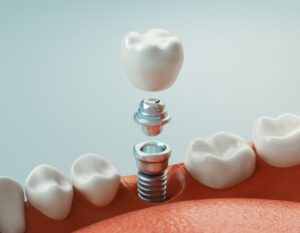
Dental implants are one of the most reliable and long-lasting solutions for replacing missing teeth. Designed to look, feel, and function like natural teeth, they’re anchored securely into the jawbone, making them a stable foundation for chewing, speaking, and smiling with confidence. But what if your dental implant starts to feel loose? This is not something to ignore. A loose implant can signal an underlying issue that needs immediate attention from your dentist. Here’s what you should know and what steps to take if your implant doesn’t feel as secure as it should.
Why Dental Implants Shouldn’t Feel Loose
One of the biggest advantages of dental implants is their stability. The titanium post fuses directly with the jawbone through a process called osseointegration. Once healed, implants are meant to feel just as strong as your natural teeth. If your implant feels like it’s moving, it’s a sign that something isn’t right.
Possible Reasons for a Loose Dental Implant
Loose Abutment or Crown
Sometimes the implant itself is not the problem. Instead, the crown (the visible tooth) or the abutment (the connector piece between the crown and implant) may loosen. This is usually a simple fix, as your dentist can tighten or replace the part without disturbing the implant post.
Bone Loss
For an implant to remain secure, it needs a healthy and strong jawbone to hold it in place. If bone loss occurs due to gum disease, infection, or other health issues, the implant may lose its stability.
Peri-Implantitis
This is an infection similar to gum disease but occurs around a dental implant. It can cause inflammation, bone loss, and eventual implant failure if not treated quickly.
Implant Failure
Although rare, sometimes implants do not integrate properly with the bone or fail years later due to stress, poor oral hygiene, or health conditions. A loose implant could mean that the implant itself is failing.
What to Do If Your Implant Feels Loose
Call Your Dentist Immediately
Don’t wait for the problem to fix itself—it won’t. The sooner you contact your dentist, the better the chances of saving the implant or at least addressing the issue before it gets worse.
Avoid Wiggling or Touching the Implant
It may be tempting to check how loose it is, but movement can make the situation worse. Leave the implant alone until your dentist examines it.
Be Careful When Eating
If possible, avoid chewing on the side of your mouth with the loose implant until you see your dentist. Stick to soft foods and avoid anything hard or sticky.
Maintain Good Oral Hygiene
Continue brushing and flossing gently around the implant area. Keeping the area clean reduces the risk of infection while you wait for your appointment.
A loose dental implant is always a cause for concern, but it doesn’t automatically mean your implant has failed. In many cases, the issue may simply be with the crown or abutment, which your dentist can fix quickly. However, because bone loss or infection could also be the cause, it’s crucial to get a professional evaluation right away. With prompt care, you can protect your implant, restore stability, and continue enjoying a healthy, confident smile.
About the Author
Dr. Andrew Barnett earned his dental degree from the University of Pittsburgh. As a board-certified periodontist, he is skilled in providing surgical services, including dental implants. To ensure he stays current with the latest techniques and technology in his field, Dr. Barnett regularly attends continuing education courses and is a member of various dental organizations, including the American Dental Association, the Texas Dental Association, and the American Academy of Periodontology. If you’re in the market for dental implants, schedule an appointment with us online or call our Dallas periodontal office at (214) 691-2614.
